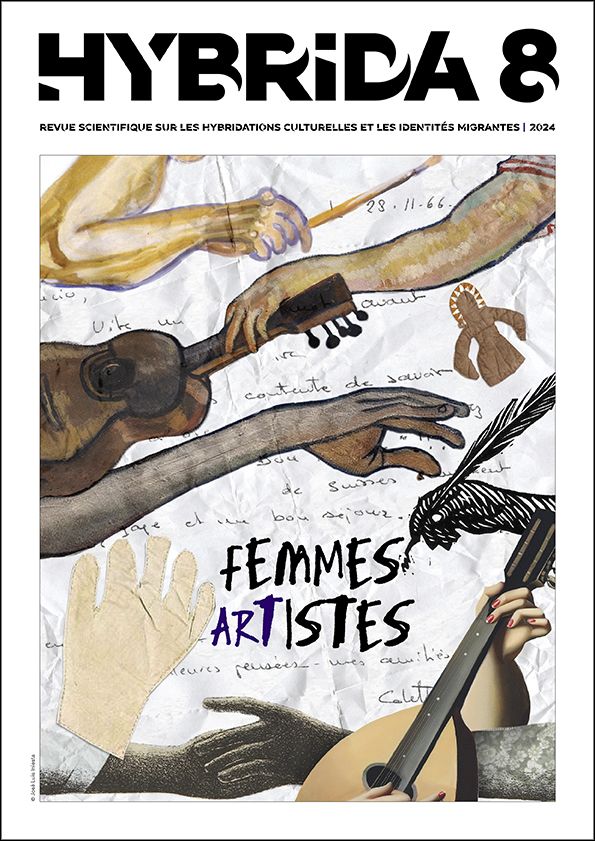A Despentian approach to the novel 'Aleana' (1979), by Argentinian José Sbarra
DOI:
https://doi.org/10.7203/HYBRIDA.8.24130Keywords:
argentinian literature, rape, motherhood, Jose Sbarra, Virginie Despentes Abstract
Abstract
Published in 1979, Aleana narrates the loneliness, wanderings and encounters experienced by Aleana in Buenos Aires at the time of the framed narrative, while mixing with memories of physical, economic and symbolic violence suffered during her childhood. From literary analysis and its dialogue with Virginie Despentes’ work, this article’s focused on the representation of sexual violence, and the tension between orality and writing and the distancing of the nuclear family as a desirable way of life to study the disaffiliation of motherhood and its reinvention as an identity, political and affective position in the public sphere.
 Downloads
Downloads
 References
References
Acosta, Laura, Lanza, Diego et Ramos Clausen, María Emilia. (4, 5 et 6 octobre 2018). Representaciones, percepciones y sentido común, herencias de la guerra psicológica [Conférence]. XI Seminario Internacional Políticas de la Memoria. Memorias subalternas, memorias rebeldes. Centro Cultural de la Memoria Haroldo Conti, Buenos Aires, Argentina. http://conti.derhuman.jus.gov.ar/2018/03/seminario/mesa_39/acosta_lanza_ramosclausen_mesa_39.pdf
Adamovsky, Ezequiel. (Août 2021). La lucha contra el racismo en América Latina: pensar con categorías propias. Le Monde diplomatique. https://www.lemondediplomatique.cl/IMG/pdf/16-17_raza_en_america_latina.pdf
Ahmed, Sara. (2010). The Promise of Happiness. Duke University Press.
Ahmed, Sara. (2012). Les rabat-joie féministes (et autres sujets obstinés). Cahiers du genre, (53), 77–98. https://doi.org/10.3917/cdge.053.0077
Ahmed, Sara. (21 avril 2016). Queer Fragility. feministkilljoys. https://feministkilljoys.com/2016/04/21/queer-fragility/
Berlant, Laurent. (2011). Cruel Optimism. Duke University Press.
Butler, Judith. (2009). Performatividad, precariedad y políticas sexuales. AIBR. Revista de Antropología Iberoamericana, 4(3), 321–336. https://doi.org/10.11156/aibr.040303
Caramella, N. S. (2017). Postfacio. In J. Sbarra, El mal amor (pp. 65–83). Dagas del sur.
D’Antonio, Débora C. (2006). Las Madres de Plaza de Mayo y la apertura de un camino de resistencias. Argentina, última dictadura militar 1976-1983. Revista Nuestra América, (2), 29–40. https://bdigital.ufp.pt/bitstream/10284/2358/3/29-40.pdf
D’Antonio, Débora C. (2017). La sexualidad como aleph de la prisión política argentina en los años setenta. INTER DISCIPLINA, 5(11), 43–56. http://doi.org/10.22201/ceiich.24485705e.2017.11.61322
Despentes, Virginie. (2006). King Kong théorie. Editions Grasset : Broché.
Despentes, Virginie (metteuse en scène). (2024). Woke [Pièce de théâtre], Théâtre du Nord, CDN Lille Tourcoing Hauts-de-France. https://www.theatredunord.fr/les-spectacles/woke
Domínguez, Nora. (1996). El desorden materno. Sobre El Dock de Matilde Sánchez. Inti: Revista de literatura hispánica, 1(43), 243–268. https://digitalcommons.providence.edu/inti/vol1/iss43/22
Domínguez, Nora. (2004). Eva Perón y Hebe de Bonafini, o la invención del nacimiento. In Ana Amado et Nora Dominguez (Compilatrices), Lazos de familia. Herencias, cuerpos, ficciones (pp. 151–181). Paidós.
Giorgi, Gabriel. (vendredi 24 avril 2015). Especies especiales. Soy, Página 12. https://www.pagina12.com.ar/diario/suplementos/soy/1-3950-2015-04-24.html
Halberstam Jack. (2011). The Queer Art of Failure. Duke University Press.
Haraway, Donna. (2019). Manifeste des espèces compagnes. CLIMATS.
Kaplan, Betina. (2007). Género y violencia en la narrativa del Cono Sur (1954-2003). Tamesis Books.
Love, Heather. (2015). Fracaso Camp. In Cecilia Macón et Mariela Nahir Solana (Éds.), Pretérito indefinido : afectos y emociones en las aproximaciones al pasado (pp. 187–203). Título.
Moreno, María. (29 septembre 16). Cuerpo argentino. Una cartografía de la literatura. Anfibia. https://www.revistaanfibia.com/cuerpo-argentino/
Segarra, Marta. (2020). Chapitre 12. Nouvelles formes de parenté et de communauté dans Vernon Subutex de Virginie Despentes. In Kate Averis, Eglė Kačkutė, and Catherine Mao (Éds.), Transgression(s) in Twenty-First-Century Women’s Writing in French (pp. 201–216). Brill. https://doi.org/10.1163/9789004442719_014
Segato, Rita Laura. (2003). Las estructuras elementales de la violencia: contrato y status en la etiología de la violencia [Conférence]. Curso de Verano sobre Violencia de Género, Université Complutense de Madrid, España. http://ovsyg.ujed.mx/docs/biblioteca-virtual/Las_estructuras_elementales_de_la_violencia.pdf
Sbarra, José. (1979). Aleana. Imprima Editores.
Solana, Mariela. (2016). Reflexiones sobre el giro afectivo en historia queer. Revista Mora, (22), 135-150. http://revistascientificas.filo.uba.ar/index.php/mora/article/view/3940
Soto, Facundo R. (16 juin 2017). La rata cruel. Pagina 12. https://www.pagina12.com.ar/44363-la-rata-cruel
Stephens, Elizabeth. & Sprinkle, Annie. (2020). Ecosex Manifestos. Annie Sprinkle & Beth Stephens. The collaboration. https://sprinklestephens.ucsc.edu/manifestos/
Verstraeten, Alice. (2009). À la charnière de l’intime et du social : quand des familles de « disparus » réélaborent leur rapport au corps et au langage. Journal des anthropologues, (116-117), 139–148. https://doi.org/10.4000/jda.3476
Weltman-Aron, Brigitte. (2018). L’écrire femme selon Virginie Despentes. Mémoires du livre / Studies in Book Culture, 9(2). https://doi.org/10.7202/1046985ar
Downloads
Published
How to Cite
-
Abstract68
-
PDF (Français )49
Issue
Section
License
![]()
All the documents in the OJS platform are open access and property of their respective authors.
Authors publishing in the journal agree to the following terms:
- Authors keep the rights and guarantee HYBRIDA the right to be the first publication of the document, licensed under a Creative Commons license Attribution-NonCommercial-ShareAlike 4.0 International (CC BY-NC-SA 4.0) that allows others to share the work with an acknowledgement of authorship and publication in the journal.
- Authors are allowed and encouraged to spread their work (once published) through electronic means using personal or institutional websites (institutional open archives, personal websites or professional and academic networks profiles) once the text has been published.
















